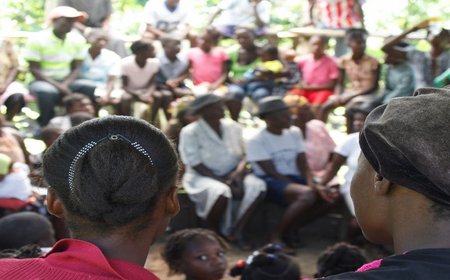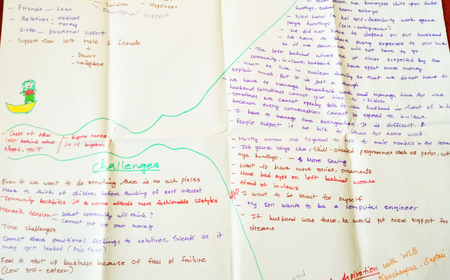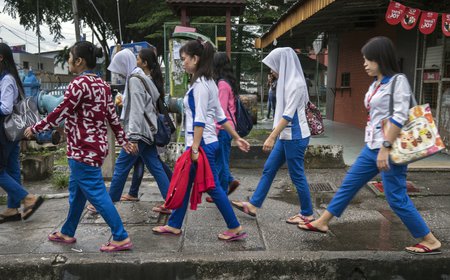COVID-19 has dramatically disrupted labour market and workplace dynamics, and has had detrimental effects on the lives of millions of workers worldwide. Yet pandemics and their fallouts are not neutral occurrences - they play out differently for citizen and non-citizen workers, and have gendered effects. Women workers – both migrants and non-migrants – are being severely impacted because of their positioning within labour markets segregated by gender, race and other axes of differentiation.
The regulatory framework and intersectional division of labour that characterise the world of work constrain individuals’ choices of jobs and employment outcomes. This compels many migrants to accept disproportionately precarious, insecure and informal work for which they receive low pay and little socio-legal recognition, particularly in female-dominated jobs. Women are also more likely to be subjected to various forms of violence in their workplaces. Many of these disadvantages and inequalities have been laid bare by the COVID-19 pandemic.
This blog is based on findings by two of us in a recent report for the IOM and explores two main issues in relation to gender, labour migration and the pandemic. The first relates to the centrality of care and juxtaposes the vital role of women migrant workers as ‘essential’ or ‘frontline’ care providers with the barriers they face in addressing their own care needs during the pandemic. The second point concerns the heightened urgency of delivering decent work and gender-responsive policies in the governance of labour migration.
Centrality of care
COVID-19 has demonstrated that it is largely the labour of both migrant and non-migrant women that is sustaining global health and social care systems. Women constitute over 70% of frontline health and social care workers globally. They are disproportionately responsible for caring for patients affected by COVID-19 in hospitals, care facilities and private homes. Many migrant women also work as cleaners within hospitals and social care settings.
Nurses, the vast majority of whom are women, have been particularly hard pressed during the pandemic. They are the most at-risk of contracting the virus through their frequent interactions with patients and insufficient access to personal protective equipment.
Migrant care workers are also essential staff at long-term elderly care facilities which became COVID-19 epicentres. Often hired on a part-time or hourly basis, many carers take on jobs in other locations to increase their working hours. In doing so, their movements between facilities increase their exposure to the virus and exacerbate its spread.
Another key ‘care’ sector is domestic work where, of the estimated 67 million domestic workers worldwide, 80% are women and 11.5 million are migrants. In many countries, migrant women constitute a large proportion of domestic workers in private households, often under ‘live-in’ arrangements. Domestic work was already among the most marginalised, least protected, least organised, and least valued employment sectors. The pandemic has only heightened this precarity.
Many women migrant domestic workers have been dismissed from their jobs and are unable to find new work or to return to their country of origin due to border closures and travel restrictions. For those who had live-in positions, losing their job also means losing their accommodation and, very often, losing their work permit too. There are also grave concerns regarding women who continue to work under lockdown measures, where sharing the private sphere with all household members exposes them to increased levels of violence and abusive behaviour.
The economic impact on women migrants
Caring for others involves the sending of remittances. In sectors experiencing significant job losses (such as tourism and hospitality), migrants were unable to send much-needed remittances home. According to the latest World Bank estimates, money remitted home by migrants will decrease by 14% by 2021 (with an estimated reduction of 20% for 2020). Wage loss has yet to be calculated globally, but the scale of the problem is already evident from data on remittances and repatriation.
In addition to lost wages, migrants are also typically unable to access financial support packages, wage subsidies, income support and social protection, including unemployment benefits. This exclusion often extends to healthcare, including maternity provisions, and stems from regressive immigration and employment laws. Since migrant women disproportionately work in the informal economy, on temporary contracts or in an irregular manner, they will have little to no social protections. Migrants also face language and information barriers in their attempts to access support services including, importantly, those for domestic violence (widely reported to be increasing).
Governing labour migration via decent work and gender responsiveness
Some countries have used the pandemic as a pretext to deepen the securitisation of migration, with politicians fostering divisions by using migrants and refugees as scapegoats. At the same time, some employers (often aided by governments) are ignoring international labour standards and forcing migrants to accept poorer terms and conditions of employment, or face unemployment, the termination of their work permit and possible deportation. Indeed, significant numbers of migrants work in sectors that are notoriously under or unregulated such as retail, labour-intensive manufacturing, tourism, hospitality and sex work.
In many migration corridors, the key markers of labour migration governance include temporary employer-tied contracts, bilateral labour agreements, and a prominent role for recruitment agencies and contractors involved in the recruitment process. With no clear allocation of who is responsible for migrant workers’ wellbeing and repatriation in times of crisis, these factors have driven substantial levels of ‘wage theft’ during COVID-19. In response, an international campaign by a coalition of civil society organisations and trade unions has called for an Urgent Justice Mechanism for Repatriated Migrant Workers to address the wage-related grievances, claims and labour disputes of the many migrants retrenched due to COVID-19.
But are there other potential pathways for realising decent work and gender equality for migrants? The Global Compact for Migration (GCM) highlights regions as important arenas in this regard, so Regional Consultative Processes and sub-regional entities such as ASEAN, Mercosur or ECOWAS should be brought into the conversation. In Asia, where bilateral labour agreements are a key tool, these agreements should include clauses allocating clear responsibility in emergencies, such as for repatriation and the provision of healthcare for migrant workers. Since regional reports on the implementation of the GCM are currently being prepared, the current crisis is timely opportunity to do so.
To ‘build back better’, do a better job
The pandemic will have long-term social and economic impacts, including in the world of work. It demonstrates not only the importance of implementing the care and decent work-related Sustainable Development Goals and objectives of the GCM, but also the urgency of gender-responsive and inclusive migration policies at national, bilateral and regional levels.
COVID-19 provides both short-term and long-term opportunities for countries to 'build back better’ by addressing systemic gender inequalities and including migrant worker populations in their recovery plans. Greater value needs to be placed on the hitherto highly precarious migrant workforce, beyond categorisations of ‘skilled’ vs ‘low-skilled’, as a significant component of all ‘key workers’ who keep societies and economies functioning at any time. A post-COVID economy will not ‘build back better’ unless it is founded in a rights-based global governance system which promotes decent work in a gender-responsive manner incorporating wage and employment protection, social welfare rights, and freedom of organisation. A better slogan, therefore, is 'build back collectively and in solidarity'.



